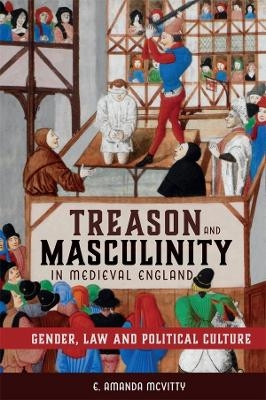
Treason and Masculinity in Medieval England
Gender, Law and Political Culture
Seiten
2020
The Boydell Press (Verlag)
978-1-78327-555-7 (ISBN)
The Boydell Press (Verlag)
978-1-78327-555-7 (ISBN)
Groundbreaking new approach to the idea of treason in medieval England, showing the profound effect played by gender.
Conflicts over treason tormented English political society in the later Middle Ages. As legal and political historians have shown, treason was always a constitutional matter as well as a legal one because it was pivotal in mediating the relationship between English kings, their political subjects and the abstraction of the crown. However, despite renewed interest in constitutional history, there has been no extended examination of treason in medieval England since the 1970s.
This pioneering study presents a new interpretation of treason, not only as a legal construct, a political weapon and a tool for constitutional thinking, but also as a cultural category, aligning it with questions of gender, vernacularity and national identity. It examines cases from the 1380s to the 1420s, revealing how kings defended their claims to sovereign authority by using the laws of treason to bind their mortal male bodies to the enduring body politic of the realm, and explains how that body politic was masculinised through its entanglement in contests over manly honour and homosocial loyalties. Drawing on evidence from trial records, legislation and chronicles, it illuminates the ways in which cultural ideals of manhood reinforced or subverted government responses to crises of legitimacy, and demonstrates that gender conditioned understandings of treason in the political arena as well as the definitions embedded in statutes and case law. At the same time, it explores the varied ways men defended themselves from accusations of treason by invoking, and in the process helping to transform, shared beliefs about what it meant to be a man in medieval England.
Conflicts over treason tormented English political society in the later Middle Ages. As legal and political historians have shown, treason was always a constitutional matter as well as a legal one because it was pivotal in mediating the relationship between English kings, their political subjects and the abstraction of the crown. However, despite renewed interest in constitutional history, there has been no extended examination of treason in medieval England since the 1970s.
This pioneering study presents a new interpretation of treason, not only as a legal construct, a political weapon and a tool for constitutional thinking, but also as a cultural category, aligning it with questions of gender, vernacularity and national identity. It examines cases from the 1380s to the 1420s, revealing how kings defended their claims to sovereign authority by using the laws of treason to bind their mortal male bodies to the enduring body politic of the realm, and explains how that body politic was masculinised through its entanglement in contests over manly honour and homosocial loyalties. Drawing on evidence from trial records, legislation and chronicles, it illuminates the ways in which cultural ideals of manhood reinforced or subverted government responses to crises of legitimacy, and demonstrates that gender conditioned understandings of treason in the political arena as well as the definitions embedded in statutes and case law. At the same time, it explores the varied ways men defended themselves from accusations of treason by invoking, and in the process helping to transform, shared beliefs about what it meant to be a man in medieval England.
E. AMANDA MCVITTY is a Lecturer in History in the School of Humanities, Massey University, Aotearoa New Zealand.
Introduction
True men and traitors at the court of Richard II, 1386-88
Tyranny, revenge and manly honour, 1397-98
The Lancastrian succession and the masculine body politic
From public speech to treasonous deed
Civic manhood and political dissent
Chivalry, homosociality and the English nation
Conclusion
Bibliography
Index
| Erscheinungsdatum | 14.09.2020 |
|---|---|
| Reihe/Serie | Gender in the Middle Ages |
| Verlagsort | Woodbridge |
| Sprache | englisch |
| Maße | 156 x 234 mm |
| Gewicht | 494 g |
| Themenwelt | Geschichte ► Allgemeine Geschichte ► Mittelalter |
| Geisteswissenschaften ► Geschichte ► Regional- / Ländergeschichte | |
| Sozialwissenschaften ► Soziologie ► Gender Studies | |
| ISBN-10 | 1-78327-555-3 / 1783275553 |
| ISBN-13 | 978-1-78327-555-7 / 9781783275557 |
| Zustand | Neuware |
| Haben Sie eine Frage zum Produkt? |
Mehr entdecken
aus dem Bereich
aus dem Bereich
eine neue Geschichte des Mittelalters
Buch | Hardcover (2023)
C.H.Beck (Verlag)
CHF 53,20


